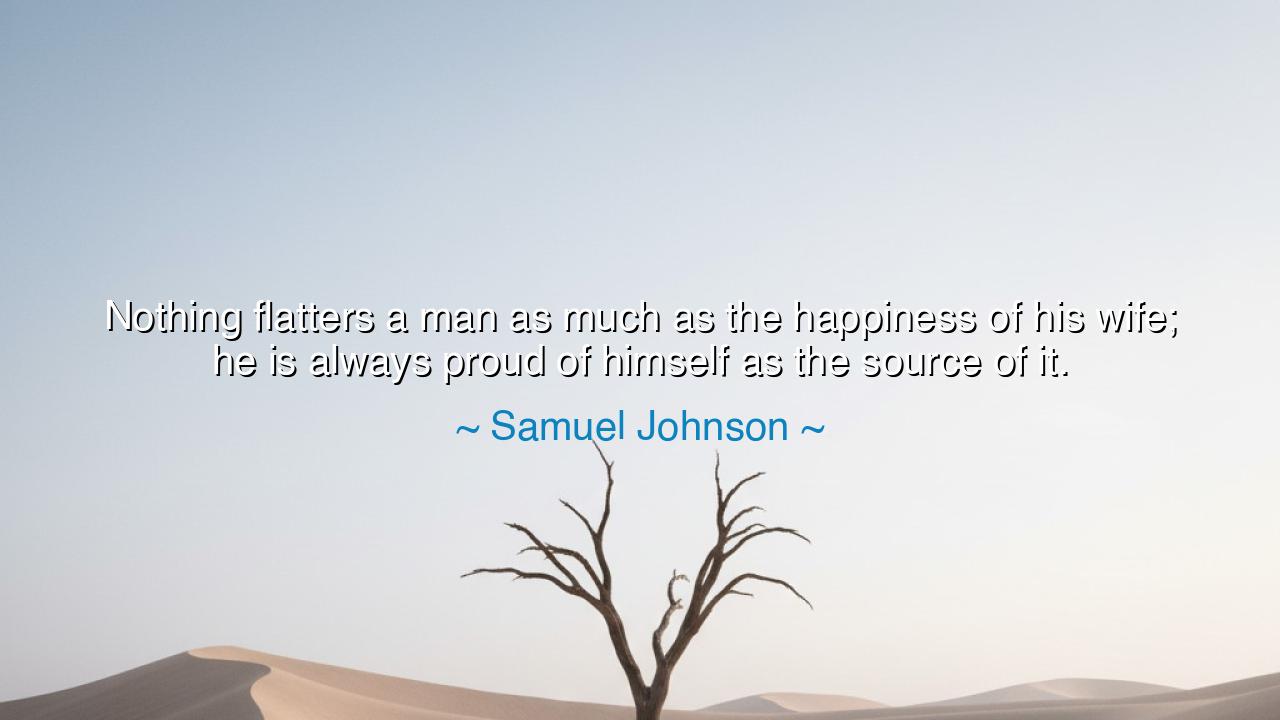
Nothing flatters a man as much as the happiness of his wife; he
Nothing flatters a man as much as the happiness of his wife; he is always proud of himself as the source of it.






In the wisdom of the English sage Samuel Johnson, we find a truth both tender and profound: “Nothing flatters a man as much as the happiness of his wife; he is always proud of himself as the source of it.” In this simple yet radiant statement lies the ancient law of love and honor — that the measure of a man’s greatness is not in his wealth, his strength, or his fame, but in the joy he brings to those he loves most. The heart of this quote is not flattery in vanity’s sense, but in the sacred satisfaction that springs from fulfilling one’s truest duty — the duty to love well.
To the ancients, marriage was more than a bond of two bodies; it was a covenant of souls, a union blessed by the gods and sanctified by virtue. In such a bond, the happiness of the wife was not her own alone — it was a reflection of her husband’s character, his compassion, and his wisdom. For a man who could bring peace to his home was seen as a master of the heart, a conqueror greater than any who triumphed in war. So when Samuel Johnson, a man of intellect and reflection, spoke of the pride a man feels in his wife’s happiness, he revealed not arrogance, but reverence — the deep joy of knowing that one’s love has borne fruit in another’s contentment.
Consider the story of Odysseus and Penelope, the eternal lovers of Homer’s song. For twenty years they were parted — he, enduring storms and monsters; she, enduring the long siege of suitors. Yet through all those trials, what sustained Odysseus was not the promise of conquest or glory, but the vision of his wife’s happiness. When at last he returned to Ithaca and found her steadfast and joyful, it was not his victories at Troy that filled him with pride, but the sight of her faith and serenity — the proof that his love and memory had kept her heart whole. His true triumph, then, was not in war, but in the peace he restored to her spirit.
So too, Samuel Johnson understood this eternal truth: that love, rightly tended, becomes a mirror in which each partner sees their own goodness reflected. When a man sees his wife smile, not out of obligation but from the deep well of contentment, he recognizes himself as both giver and guardian of that joy. It is not power that moves him, but tenderness. Her happiness becomes his crown, her peace his reward. And in that exchange — quiet, mutual, enduring — the soul finds its highest praise.
Yet there is a lesson here for both men and women, for this harmony does not come by chance. It is forged through patience, humility, and mutual care. A man must labor not only with his hands but with his heart — listening, understanding, sacrificing when needed. The happiness of his wife is not a prize he can seize; it is a gift that blooms only where respect and affection are constant. And a woman, too, must know that her joy is not submission, but strength — for her warmth and faithfulness nourish the spirit of her home. Together, they build a life that time itself cannot diminish.
The world often praises ambition and achievement, but few remember that the home is the first kingdom and the family the first realm. A man who rules kindly there has no need of further crowns. The happiness of his wife becomes his living monument — not carved in marble, but in laughter, in the quiet evenings of shared peace, in the eyes of children who witness love in action. This is the glory that does not fade, for it is built not on vanity but on virtue.
Therefore, let this be the teaching: Seek not flattery in the eyes of strangers, but in the joy of those who dwell within your heart. Let your worth be measured not by applause, but by the serenity of your home. If your love brings another comfort, if your presence brings another peace, then you have achieved greatness beyond gold or power. For as Samuel Johnson reminds us, when a man looks upon his wife’s happiness and sees his own goodness reflected there — that, indeed, is the highest and purest pride.
Thus, the teaching ends as it began — in humility and devotion. For the truest victory in life is not to be adored by many, but to be cherished by one, and to know that through kindness, patience, and steadfast love, you have become the source of another’s happiness. And in that sacred knowledge, the heart of man finds its eternal reward.






AAdministratorAdministrator
Welcome, honored guests. Please leave a comment, we will respond soon